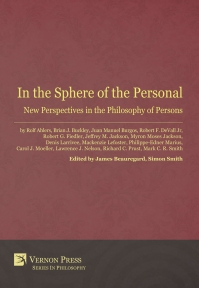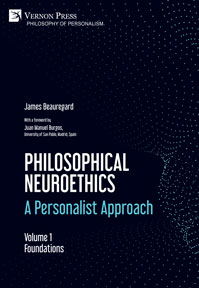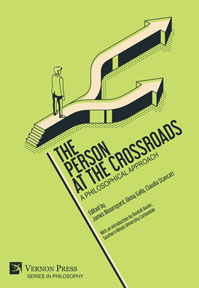Personalist Neuroethics: Practical Neuroethics. Volume 2
by James Beauregard (Rivier University)
Purchase this book
(click here to change currency)
The new volume by the author James Beauregard, “Personalist Neuroethics: Practical Neuroethics. Volume 2”, is the essential complement to the first one “Philosophical Neuroethics: A Personalist Approach. Volume 1,” on whose foundations of philosophical-anthropological construction the building of the practical application of Neuroethics can now be built, not only to knowledge but also to human praxis and behavior.
Thus, it responds to the true vocation of Bioethics, one of whose most urgent subspecialties is Neuroethics. The work systematically and clearly analyzes the neuroethical conflicts that arise at the beginning of life, in situations of vulnerability, at the end of life, and in the transhumanist and posthumanist processes that lead to human enhancement.
Without this bioethical analysis of the new possibilities that scientific progress opens up in the exploration, understanding and interaction with our neurological systems and our consciousness, scientific-technological progress can, in reality, represent a setback, due to its capacity to attack the dignity and integrity of the human being. However, Beauregard's precise notes help guide the potential of neuroscience towards personal construction, balance and the true progress that builds freedom.
Finally, the social derivative of the disciplines related to neuroethics deserve a detailed analysis in the second part of the book: “Social Neuroethics.” The person, being in relationship, must deal in her existence in friction with others, and this scenario is the place where the conflict arises and, also, the need for ethical analysis. Situations related to the world of justice, the media, the academic context, war and social conflicts or religion, are the fertile ground for the neuroethical dilemma, to whose resolution Beauregard's essay successfully contributes.
Prof. Dr. Julio Tudela Cuenca
Director for Master's Degree in Bioethics
Universidad Católica de Valencia San Vicente Mártir, Spain
The second volume of James Beauregard’s “Personalist Neuroethics” is a timely and much-needed contribution to the current conversation on personhood, ethical decision-making, and neuroscience. Dr. Beauregard brings to this book a remarkable range of areas of expertise, which gives him the ability to bring together personalist philosophy, neuroscience, medical ethics, and an attention to media studies, military ethics, and the law. He offers us a vision of the person as unified, integrated wholes, a holistic vision with a clear place for scientific understanding of the brain and the principles of neuroethics, but without the reductionisms that often attend medical ethical thinking. His vision attends carefully to the deep dignity of persons, to personal responsibility, and to justice and the common good. The result is a deep and wide-ranging approach to neuroethics that is at once philosophically rigorous and immediately practically applicable.
Prof. Dr. Mark K. Spencer
University of St. Thomas
Assistant Editor, American Catholic Philosophical Quarterly
Academic Advisor, The Hildebrand Project
Contemporary neuroscience urgently needs serious ethical reflection based on a sound philosophical method and a non-reductionist vision of human being. Beauregard´s personalist neuroethics is singularly fitted to meet this demand as it is based on the rich personalist philosophical tradition and is inspired by von Hildebrand´s phenomenological material value ethics.
Prof. Martin Cajthaml
Department of Philosophy and Patrology, Sts Cyril and Methodius Faculty of Theology
Palacky University Olomouc, Czech Republic
“Personalist Neuroethics” is a fascinating exploration of the personalist philosophy with an emphasis on important practical implications. Thorough and comprehensive in its discussion, it is a major work in this field and essential reading for those who want to understand how the person relates to many facets of life and living.
Andrew Newberg, MD best selling author of “How God Changes Your Brain.”
Professor, Department of Integrative Medicine and Nutritional Sciences
Professor, Department of Radiology
Research Director, Marcus Institute of Integrative Health
Thomas Jefferson University
Clear, coherent, and complete, “Personalist Neuroethics: Practical Neuroethics. Volume 2” offers a solid foundation for neuroscience in personalist philosophy. Particularly practical in its detailed presentation of issues where neuro- intersects with contemporary concerns, including the dialogue with faith.
Mary Clare Smith, SND, PhD
A much-needed book that bridges the gap between personalist philosophy and practical neuromedicine. Too often, conversations in bioethics begin from unexamined materialistic assumptions about the human person, leaving the dignity of the person something of a mystery. Beauregard's treatment, however, gives personal dignity firm philosophical grounding. He manages to do this, however, without drifting away from a concrete basis in contemporary science and medical practice.
Dr. D.T. Sheffler
Professor of Philosophy, Memoria College
Associated Scholar, The Hildebrand Project
In his first volume on personalist neuroethics, James Beauregard set out an innovative philosophical approach that could create space for rich and humane neuroethical dialogue. In the present volume, he puts that approach to work to generate wise and thoughtful reflections on a range of personal and social neuroethical issues. This book is to be commended for the range of insights it offers on diverse neuroethical topics.
Dr. Neil Messer
Professor of Theology, Department of Philosophy, Religions and Liberal Arts
University of Winchester
President, Society for the Study of Christian Ethics
In this fine work, a worthy successor to the first volume, James Beauregard brings us back to the essence of neuroethics as a philosophical discipline concentrated on values: the irreducible value of the human person and the moral and non-moral values involved in neuroscientific description, research, and medicine. The structural centrality of the person in human life is also inherently social, and Dr. Beauregard delves philosophically and meticulously into the values implicated in the many individual and social concerns of neuroscience, whether the beginning of life, human enhancement, or the activities of war. The final chapter’s insights into the mutual relevance of neuroethics and religious faiths offers much-needed inspiration toward renewal of the crucial dialogue between science, philosophy, and theology.
Christopher M. Reilly
Pontifex University
'Personalist Neuroethics: Practical Neuroethics. Volume 2' is the second volume by the author to address ethical questions in neuroscience. The first volume dealt primarily with theoretical issues, while the present volume delves into specific and concrete ethical dilemmas that arise in neuroscience research and practice. The topics covered include human dignity and neuroethics, neuroethical issues at the beginning of life (e.g. stem cell use in neuropsychiatric treatments), neuroethics and injured persons (e.g. brain injury and disorders of consciousness, brain-computer interface technology), neuroethics at the end of life (e.g. dementia care), the ethics of enhancement, and neuroethics as it impacts forensics and the justice system, the media, national security and warfare, and the rarely discussed topic of neuroethics and religion.
List of Figures and Tables
Acknowledgements
Foreword
Juan Manuel Burgos,
University of San Pablo, Madrid, Spain
Introduction
Chapter 1 Personalism, In Brief
Chapter 2 Human Dignity and Neuroethics
Part 1. Individual Neuroethics
Introduction to Part 1
Chapter 3 Neuroethics and The Beginning of Persons
Chapter 4 Neuroethics and Injured Persons
Chapter 5 Neuroethics and The End of Persons
Chapter 6 Neuroethics and Enhanced Persons
Part 2. Social Neuroethics
Introduction to Part 2
Chapter 7 Neuroethics, Justice and Forensics
Chapter 8 Neuroethics and the Media, Neuroethics and the Academy
Chapter 9 Neuroscience, Neuroethics and War
Chapter 10 Neuroethics and Religion
Conclusion
Bibliography
Index
James Beauregard is a clinical neuropsychologist and Lecturer in the Psychology Doctoral Program at Rivier University, Nashua, New Hampshire, USA, where he teaches Biological Bases of Behavior and Psychology Health Care Ethics. His research interests are in neuroethics and personalist philosophy, including the intersection of these two areas as they impact our understandings of personhood. He is a member of the Spanish Personalist Association, on the board of the International Personalist Conference, and a member of the British Personalist Forum and the International Neuroethics Society. In 2021, he was asked to serve on the Committee on Neuroethics at the Pontifical Academy for Life.
Juan Manuel Burgos, neuroethics, bioethics, neuroscience, personalism, Dietrich von Hildebrand
See also
Bibliographic Information
Book Title
Personalist Neuroethics: Practical Neuroethics. Volume 2
ISBN
978-1-64889-724-5
Edition
1st
Number of pages
307
Physical size
236mm x 160mm

![Personalist Neuroethics: Practical Neuroethics. Volume 2 [Paperback]](/file/20840/5ef7b380636b5e8516b14f32160a13ed/1685960200.jpg)






